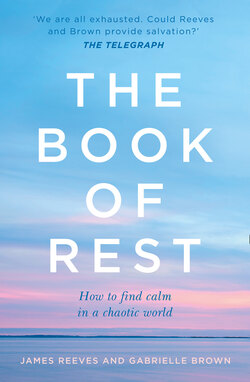Читать книгу The Book of Rest - James Reeves - Страница 20
Rest and your feelings
ОглавлениеThe times in our life when we feel most rested are the times when we are not wishing to change any particular aspect of our experience. And herein lies the problem: the times we feel most rested are the times when we need rest the least. When we’re overwhelmed by our experiences and our feelings, our desire to control them becomes stronger, and we rest less. We are rest-less.
During the course of our lives, we have had spells of feeling wonderful, awful, bored, depressed, extraordinary, anxious, weird, ill and, occasionally, something that we might call normal. We suspect you have had a similar journey, and perhaps like us, you couldn’t always put your finger on why you felt one way or another. Feelings can be like that: unpredictable, unexpected, uncontrollable, unfathomable – all the uns.
How many times have you said to yourself after something you were dreading, ‘That wasn’t so bad!’? Or have you ever found yourself moved to tears quite unexpectedly by a film or book (or even an advert)? And what about anger? Intense rage can fire up out of nowhere – stubbing your toe, a snappy comment from a colleague who hits the wrong button (a button you maybe didn’t even know you had), a slow driver when you’re already cutting it fine.
And then there’s anxiety, the tenacious destroyer of all things restful, coming at the most unexpected of times and leaving in just the same way.
ASK YOURSELF
Can you recall a time when an intense emotion came up seemingly out of nowhere?
Once we recognise that feelings are flighty fellows, we can become open to the possibility that there is not much to be gained from trying to control them. We might start to see that it is our incessant desire to control how we feel and control the experiences that we think will lead to us experiencing particular feelings that exhausts us and, ironically, leaves us feeling the very thing we wish not to feel.
Once we realise that how, why and when we feel the things we feel is not something we have all that much control over, we might want to ask ourselves if there is much point in becoming overly attached to or afraid of any of our feelings or the experiences we think they relate to. Feelings will come and go, and we’ll rarely know exactly why.
With all these unforeseen feelings playing out as they seemingly so wish, there is, perhaps surprisingly, an opportunity to consider ourselves a little less at their mercy. There is the chance here to step back and notice an inherent calm amidst this chaos. Whenever we experience a feeling, we also notice it. We are aware of it coming and going. We watch it. We observe it. We provide a space in which it can play out, and then leave. So what is this space? Who is this ‘watcher’, this ‘awareness’? What is this awareness feeling?
Is it possible that the part of you that is watching your feelings is not actually feeling your feelings?
Amidst the hurly-burly, chaotic, exhausting playing out of your emotions, is it possible that there is part of you – the deepest, most essential aspect of your being – that is always there just watching? Is it possible that regardless of what it is watching, this aspect of your being is always OK? It is always at peace? It is always just. . . being?
Rest requires us to give up any ideas about control: controlling our experiences, controlling our feelings and controlling how we rest. Rest is fundamentally effortless and detached from experience. Rest is, therefore, a means to connect with this always-at-ease awareness that is the essence of your existence – perhaps just to glimpse, perhaps to loiter. Ultimately, rest both connects you with this ease and reminds you that it is there, that at your very depths, you are always restfully being.
